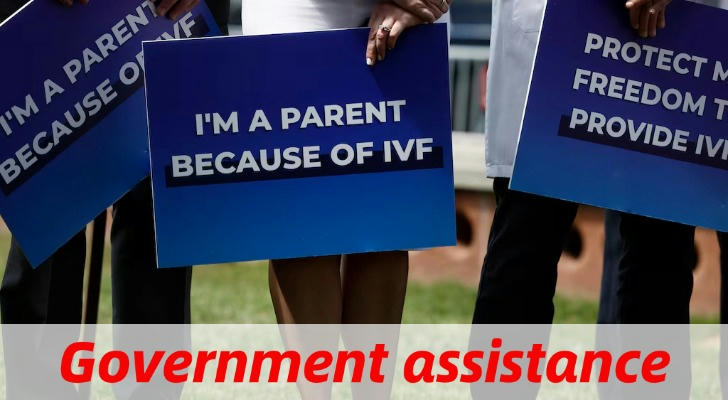IVF is too expensive? You're not alone - see how these families got government financial aid
In the United States, IVF and other fertility treatments can cost up to $25,000—but many same-sex couples, older women, single parents, and others now have real financial help through government grants. With success rates increasing, even 1-3 IVF cycles can result in a healthy baby. Want to know if you qualify?

🎯 Who can apply for these fertility subsidies?
These programs are no longer limited to "married heterosexual couples", but serve everyone who dreams of having children:
- ✔️ Women aged between 18 and 45 (some programs are relaxed to 50 years old)
- ✔️ Medically diagnosed with infertility
- ✔️ Same-sex couples, transgender people, single parents, and those who have independent childbearing intentions
- ✔️ Annual income is at a low to medium level (depending on the program)
- ✔️ Have a clear treatment plan and can cooperate with medical procedures
🌟 Some programs also give priority to supporting LGBTQ+ families, older women, veterans, and unemployed families.
💡 Real case sharing: Katie & Rachel's fertility journey
Katie and Rachel are a same-sex couple from Illinois. After multiple failed artificial inseminations, their doctor recommended trying IVF. But faced with a treatment budget of up to $20,000, they almost gave up.
Until they found Baby Quest Foundation, a non-profit organization dedicated to supporting atypical families in assisted reproduction.
They submitted medical certificates and personal statements, telling their stories and their desire to be parents.
A few months later, they successfully obtained a grant of $13,000 to cover most of the IVF costs. In 2023, they welcomed a healthy daughter.
🎤 "We are not lucky, we just found the right channel." — Katie
📌 What assisted reproduction programs can you apply for?
- 🔹 Artificial insemination (IUI): Suitable for young women with healthy ovarian function
- 🔹 In vitro fertilization (IVF): Many states have government subsidies or non-profit funding, and each person can support up to 1~3 times
- 🔹 Egg freezing: Suitable for working women who are not yet ready to have children or those who are older and want to delay pregnancy
- 🔹 Sperm/egg donation: Provide support for same-sex families, premature ovarian failure, and patients with chromosomal problems
- 🔹 Legal surrogacy: Some states can apply for specific funding programs
- 🔹 There are also special subsidies for additional expenses such as fertility drugs, examinations, and freezing costs!
📣 Which institutions and policies support these plans?
✅ Fertility Within Reach
Provides practical operation manuals, drug subsidy toolkits, and communication guides with doctors, which are very suitable for first-time applicants. It also provides policy advice for families to help you prepare for "negotiating funding" before seeing a doctor.✅ RESOLVE National Infertility Association
Committed to promoting government reform and patient rights. Starting in 2025, all federal employees can apply for a fertility support plan for up to 3 IVF cycles, regardless of marital status or sexual orientation, including same-sex/heterosexual spouses and single applicants.✅ State Mandated Insurance Coverage
More than 20 states in the United States have established mandatory coverage policies for fertility treatment insurance (such as Massachusetts, Illinois, New Jersey, Connecticut, etc.), and some states even include LGBTQ+ couples and independent applicants. You can confirm with the insurance company whether the treatment costs such as IUI, IVF, and drugs are covered.✅ New York State IVF Grant Program
Provides IVF cost subsidies for families with an annual income within a certain range, generally $2,500–$5,000, applicable to designated cooperative clinics.✅ Department of Veterans Affairs
Provides assisted reproductive benefits, including IVF and embryo preservation, to eligible veterans and their spouses, especially for cases where fertility is impaired during service.✅ Military Family Building Coalition & TRICARE
Some military families can apply for reimbursement or reduction of fertility treatment costs through TRICARE health insurance, covering medications, laboratory tests and part of IVF costs.

📝 The application process is not complicated:
1️⃣ Find a funding agency that you qualify for
2️⃣ Prepare a doctor's certificate, income materials and a brief fertility statement
3️⃣ Submit the form and wait for review
4️⃣ After the review is passed, you can get funding/treatment support, and even a professional consultant to help you complete the entire cycle!
🌈 Having a child should not be a privilege; it is everyone's right.
Whether you are an independent woman, a same-sex couple, a transgender group or have limited income, as long as you have the desire to become a parent, you deserve to be seen seriously.
👇 Tell us your story or question in the comments section, and share support and encouragement with more people!
#AssistedReproductiveFunding #TestTubeBaby #IVF #FertilitySupport #LGBTQFamily #SingleMom #USFertilityBenefits #GovernmentFunding #FertilityDream #ParentingHope
